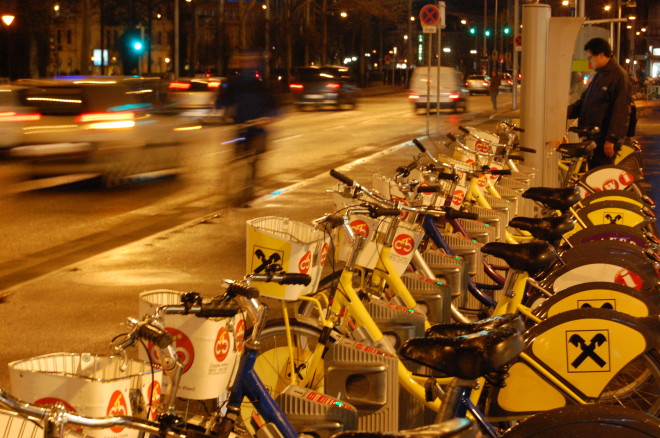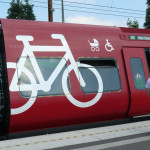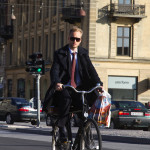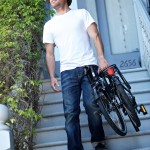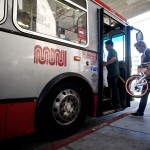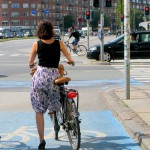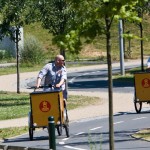
Bicycle Sharing: The Gateway Drug
 |
 |
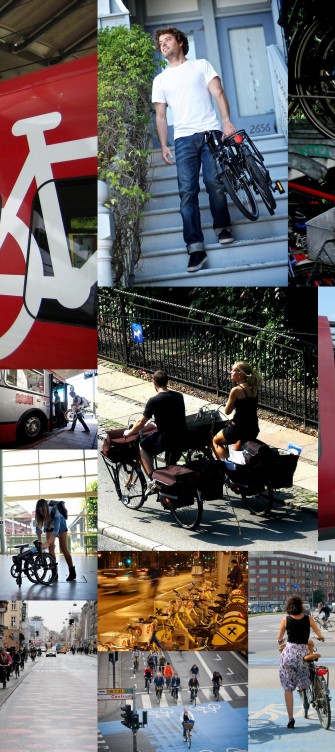 |
 |
|
|
(Monday, April 30) |
(Thursday, May 3) |
(Friday, May 4) |
We developed a series of articles for the ITF. You can click on the picture above to see them as soon as they're online. For Post-coverage of the ITF, click here
You can't help but notice it. It seems that every city already has, or is about to have a bicycle share scheme. They're without a doubt the 'must have' form of public transport of the 21st Century, with over 400 European cities having a public bicycle share system.
Switch back ten years, and bike sharing was in its infancy. In 2001, Vienna left one thousand painted bicycles lying around the city for anybody to use.
"No registrations. Nothing . You could just take it and leave it anywhere," says Maria Vassilakou, Vice-Mayor of Vienna.
Resources
See our Bicycle Share Brochure, made especially for the International Transport Forum
While the idea was great Vassilakou admits that "3 months later, nearly all of the bicycles had been stolen."
Despite this early experiment ending in disaster, it revolutionized the way people viewed the bicycle in the Austrian capital. It proved to be a brilliant stepping stone to an automated bike share system. In the near future, the city has plans to install an electric bicycle share scheme.
Bike sharing in Europe has come along way since then. In 2001, only a few systems were in operation. Today that number exceeds 400. There are also signs of growth in Asia, with 33 Chinese cities operating such schemes. As a recent UN report notes, bike sharing has gone from “interesting experiments in urban mobility to mainstream public transport options in cities as large and complex as Paris and London”. Growth in this area has outstripped that of any other area of urban transport. They’re popping up in London, Dublin, Barcelona, Paris and soon New York, all of which are not normally coined ‘Bicycle Cities’.
"They are without a doubt, the lowest hanging fruit for bicycle advocates," says ECF Policy Officer Fabian Kuester.
"While you're not going to see huge increases in cycling with public bikes alone, they're great for visibility, and they make politicians see that cycling truly is a viable mode of transport."
It all began in Paris
Well not exactly... but Paris is often pinned up as the “poster boy” of Bike-share schemes and the Vélib’ system has been remarkably successful. Launched with a fleet of 7,000 bicycles in 2007, by February 2012, it now has more than 20,000with over 105 million rentals since its inception. It has attracted Parisians with its low cost, convenience and its connectivity with public transport. Like most schemes, users do not pay for the first half hour of use, with a 24 hour ticket costing €1,70 and an annual subscription only €29.
Vélib’ users can use their metro subscription to hire bicycles and it offers the only 24 hour public form of transport in the French capital. While cities often have to spend big to subsidize Public Transport, the City of Paris actually makes €14m a year from Vélib’ subscriptions and other services.
Next Generation Public Bicycles
"We're creating a new generation of public bicycles which are radically designed for public space ," says Phillip Douglas, CEO of Velobility which provides public cycling solutions globally.
Revealing a prototype at the International Transport Forum in Leipzig, he explains that the bicycle has "smart technology" which means it can be unlocked with a smart phone, and it also has GPS tracking, allowing cities to know exactly where bicycles have travelled.
According to Douglas, next generation bike share systems must be "low maintenance".
"If maintenance makes up a large part of your bicycle share fleet, it's time to think about changing product."
But without a doubt, the real winner of these smart bicycles will be their ability to map the activity of its users. City authorities will know exactly how the bicycles get from A to B with data collected from the bicycles. The rammifications for urban planning could be enormous.
With Vienna, Brussels and even Doha looking at installing "Smart" electric bicycle share schemes, the future of bike sharing looks very bright indeed.
 About the Author
About the Author
Julian Ferguson is the Communications Officer for the European Cyclists’ Federation. Originally hailing from Australia and a keen bicycle advocate, he plans one day to ride his bicycle from Brussels to Melbourne
Photos
Contact the author
Recent news!
Upcoming events
Contact Us
Avenue des Arts, 7-8
Postal address: Rue de la Charité, 22
1210 Brussels, Belgium

